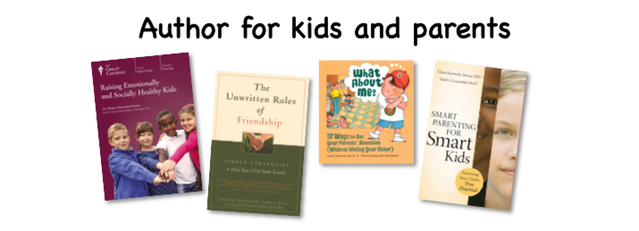Parenting
Preventing Mom Meltdowns and Dad Detonations
Six ways to stay calm in tough parenting moments.
Posted April 30, 2013

Q: I love my kids, but sometimes they get to me--especially when they just don't listen, or they're arguing with each other all the time. I feel horrible after I yell at them. What can I do to keep myself from losing my cool with my kids?
Parenting is a physically and emotionally demanding job. Children are delightful, and playful, and adorable, but they’re also noisy, messy, and unreasonable. As much as we love our children, we’ve all had moments of feeling exasperated with them.
Observational research tells us that toddlers can need correction as often as every six to nine minutes, and that about one out of every five interactions between preschool and toddler siblings involves intense negative emotions. Bigger kids can mean even bigger conflicts. No wonder parents sometimes feel like they're at their breaking point!
The best strategy for dealing with mom meltdowns or dad detonations is prevention: Get enough rest, healthy food, exercise, social contact, and other recharging activities, so you're "fueled up" to do the job. You can't possibly be the kind of parent you want to be if you're running on empty. Planning ahead for a situation you know will be difficult can also help, especially if you get the kids' in-put in coming up with solutions.

But what can you do in the heat of the moment, when you feel like you're about to explode?
1) Clap your hands once, forcefully and loudly. The shock of the noise can momentarily stop whatever is going on to give you a chance to think, and the sting on your hands can help you remember that you don't want to hurt your children.
2) Delay your response. If you feel like yelling, try to do something else first. Count. Drink a glass of water. Suck on an ice cube. Even a 30-second delay can help you break through the automatic angry response and give you a moment to regain self-control.
3) Give yourself a time out. You may need to step away from everything to regain control. Make sure your children are safe, and then find a space where you can be alone: the bathroom, the shower, maybe even just outside your door. During this time, don't rehearse in your mind statements about how awful the kids are behaving--that will just get you more riled up. Try to do something distracting and calming: reading, listening to music, yoga, or aromatherapy are possibilities. Some parents find that cleaning calms them, because it's mindless and because seeing improvement in their living conditions helps them feel more in control. Only do this if you can do it without resentment. Cleaning while thinking, "I hate my life" won't help you feel calmer.
4) Get out of the house. A change of scenery can help you feel less trapped. Take everyone "as is" for a drive or a walk or just into the backyard until you feel calmer.
5) Take an observer's perspective. We're most likely to feel angry with our children when we feel like they're deliberately trying to annoy us. But most of the time, that's not what's happening. Pretending that you are an observer can help you take misbehavior less personally. Maybe you want to imagine that you're a teacher or a scientist watching your child to figure out what the child needs to learn.
6) Don't go it alone. If your partner or spouse is available, explain that you need a break. Swapping responsibility for the kids when one of you is feeling depleted is an important way that parents can take care of each other. You could also call a sympathetic friend, or better yet, get together with that friend. Explain that you're in desperate need of adult company. Your friend will understand. He or she has been there, too.
What strategies have you found helpful to keep your cool as a parent?
_____________________________________________________
© Eileen Kennedy-Moore, PhD. Google+ Twitter: psychauthormom
Eileen Kennedy-Moore, PhD, is an author and clinical psychologist in Princeton, NJ (lic. # 35SI00425400). She frequently speaks at schools and conferences about parenting and children’s social and emotional development. www.EileenKennedyMoore.com
Subscribe to Dr. Kennedy-Moore’s monthly newsletter to be notified about new posts on the Growing Friendships blog.

Dr. Kennedy-Moore's books and videos:
-- Have you ever wanted a parenting course you could do at YOUR convenience?Check out this fun and fascinating audio/video series on children’s feelings and friendships from The Great Courses®: Raising Emotionally and Socially Healthy Kids. || Topics include: Teaching Kids to Care; Developing Genuine Self-Esteem; How Kids Manage Anxiety and Anger; Playing Well With Others; Growing Up Social in the Digital Age. VIDEO preview.
On sale 70% off at: www.TheGreatCourses.com/Kids
-- Smart Parenting for Smart Kids: Nurturing Your Child's True Potential || Chapters include: Tempering Perfectionism; Building Connection; Developing Motivation; Finding Joy. VIDEO preview.
-- The Unwritten Rules of Friendship: Simple Strategies to Help Your Child Make Friends || Chapters include: The Shy Child; The Little Adult; The Short-Fused Child; The Different Drummer.
-- What About Me? 12 Ways To Get Your Parents' Attention Without Hitting Your Sister. VIDEO preview.
Growing Friendships blog posts are for general educational purposes only. They may or may not be relevant for your particular situation. You’re welcome to link to this post, but please don’t reproduce it without written permission from the author.
photo credits:
woman: “AAAARRRGGGHHH” by Evil Erin / CC BY 2.0
man: “Movember – Day 20” by Joe Stump / CC BY 2.0
_____________________________________________________
For further reading:
Dunn, J., Creps, C., & Brown, J. (1996). Children’s family relationships between two and five: Developmental changes and individual differences. Social Development, 5, 230-250.
Minton, C., Kagan, J., & Levine, J. A. (1971). Maternal control and obedience in the two-year-old. Child Development, 42, 1873-1894.
Power, T. G., & Chapieski, M. L. (1986). Childrearing and impulse control in toddlers: A naturalistic investigation. Developmental Psychology, 22, 271-275.
Shanahan, L., McHale, S. M., Osgood, D. W., & Crouter, A. C. (2007). Conflict frequency with mothers and fathers from middle childhood to late adolescence: Within- and Between-families comparisons. Developmental Psychology 43, 539-550.



